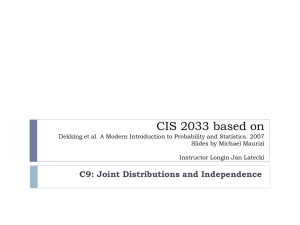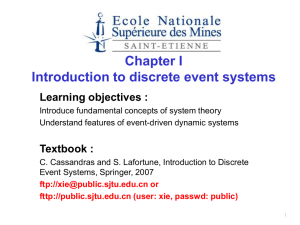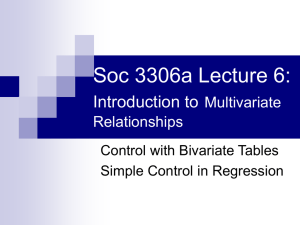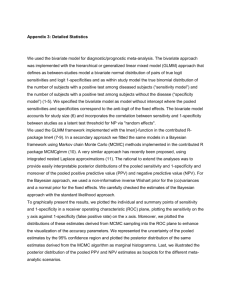STAT 312Toggle
advertisement
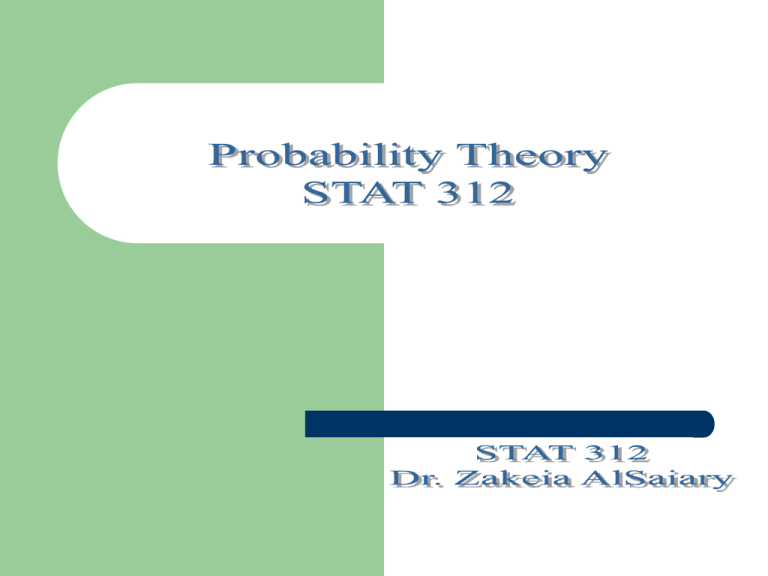
Review some statistical
distributions and characteristics
Probability density function
moment generating function,
cumulant generating functions
Probability Theory: Sets
Characteristic function is defined as an expectation value of the
function - e(itx)
C (t ) e(itx) f ( x )dx
Moment generating function
is defined as (an expectation of e(tx)):
M (t ) e(tx) f ( x )dx
Moments can be calculated in the following way. Obtain derivative of
M(t) and take the value of it at t=0
d n M (t )
E( x )
dtn t 0
n
Cumulant generting function is defined as logarithm of the
characteristic function c. g. f . log(C (t ))
Review : Assignment ( 1 )
Write all p.d.f , c.d.f and properties for all
discrete and continuous distribution you
study in STAT 211.
TWO RANDOM VARIABLES
There are many random experiments that involve
more than one random variable. For example,
an educator may study the joint behavior of
grades and time devoted to study; a physician
may study the joint behavior of blood
pressure and weight. Similarly an economist may
study the joint behavior of business volume and
profit. In fact, most real problems we come
across will have more than one underlying
random variable of interest.
TWO RANDOM VARIABLES
هناك العديد من التجارب العشوائية التي تعتمد على أكثر متغيرعشوائي
على سبيل المثال،
-1دراسة العالقة بين درجات الطالب والوقت المخصص للدراسة.
-2دراسة العالقة بين ضغط الدم والوزن.
-3دراسة العالقة بين حجم األعمال والربح.
في الواقع ،فإن معظم المشاكل الحقيقية تشمل وجود أكثر من متغير عشوائي
Bivariate Discrete Random Variable
Discrete Bivariate Distribution
التوزيعات الثنائية المنفصلة
Bivariate Discrete Random Variables In this
section, we develop all the necessary
terminologies for studying bivariate discrete
random variables.
Definition 7.1.p 186: A discrete bivariate
random variable (X, Y ) is an ordered pair of
discrete random variables.
TWO RANDOM VARIABLES
التوزيع االحتمالي المشترك joint probability distribution
للمتغيرين المنفصلين ) (X,Yهو دالة احتمالية مشتركة ) f(x,yتعطي
إحتماالت قيم ) (X,Yالمختلفة وتعرض هذه الدالة في صورة جدول
مستطيل أو في صيغة رياضية تبين قيم ) (X,Yالمختلفة واحتماالت هذه
القيم وتعرف هذه الدالة كاآلتي:
) f XY (x , y ) P (X x ,Y y
وهذه الدالة تحقق:
) (1)f XY (x , y ) 0 for all ( x , y
(2) f XY (x , y ) 1
y
x
Defintion 7.4. p192
Let (X, Y ) be any two discrete bivariate
random variable. The real valued function F
is called the joint cumulative probability
distribution function of X and Y if and only if
F ( x , y ) P ( X x ,Y y )
f (s , t )
s x t y
P (a X b , c Y d )
b
d
x aY c
f (x , y )
Bivariate Discrete Random Variable
(Joint discrete distribution)
Example:
Roll a pair of unbiased dice. If X denotes the
sum of Points that appear on the upper
surface for the two dice and Y denotes the
largest points on the dice. Find the joint
distribution for X, Y
هي مجموع النقاط التيx فإذا كانت،ألقيت زهرتي نرد مرة واحدة
أوجد الدالة االحتمالية. تظهر على السطح العلوي للزهرتين
X, Y المشتركة للمتغيرين
فراغ العينة إللقاء زهرتي نرد:
Solution:
S ={ (1, 1), (1, 2), (1, 3), (1, 4), (1, 5), (1, 6),
(2, 1), (2, 2), (2, 3), (2, 4), (2, 5), (2, 6),
(3, 1), (3, 2), (3, 3), (3, 4), (3, 5), (3, 6),
(4, 1), (4, 2), (4, 3), (4, 4), (4, 5), (4, 6),
(5, 1), (5, 2), (5, 3), (5, 4), (5, 5), (5, 6),
})(6, 1), (6, 2), (6, 3), (6, 4), (6, 5), (6, 6
Probability Theory
Y
1
2
3
4
5
6
2
1/36
0
0
0
0
0
3
0
2/36
0
0
0
0
4
0
1/36
2/36
0
0
0
5
0
0
2/36
2/36
0
0
6
0
0
1/36
2/36
2/36
0
X
7
8
Probability Theory
Y
X
2
3
4
5
6
7
8
1
2
3
4
5
6
Probability Theory
F (4 , 3 ) = P ( X ≤ 4 , Y ≤ 3 )
= 1/36 + 2/36 + 1/36 + 1/36 = 6/36
P(6≤X≤8,4≤Y<6)
= 2/36 + 2/36 + 2/36 + 2/36 + 1/36 + 2/36 =
11/36
Probability Theory
EXAMPLE: If the probability joint distribution
for X, Y is given as:
f ( x , y ) q 2 p y 2 ; x 1, 2,..., y 1
y 2,3, 4,....,
0 p 1, q 1 p
1- Show that f(x,y) is probability mass function?
2- Find f( 2, 4 ).
3- Find F( 2,4).
Solution:
:
Solution:
:
Marginal probability density function of
X:
Definition 7.3. p188 : Let (X, Y ) be a discrete
bivariate random variable. Let R X and RY be
the range spaces of X and Y , respectively.
Let f(x, y) be the joint probability density
function of X and Y . The function
f1(x )
f
(x , y )
y R y
is called Marginal probability density function of
X. Similarly, the function
Marginal probability density function of
Y:
Similarly, the function
f 2 ( y )
f
(x , y )
x R x
is called Marginal probability density function of Y.
Probability Theory
Example : Let X and Y be discrete random
variables with joint probability density
function f(x, y) = ( 1/21 (x + y)
if x = 1, 2;
y = 1, 2, 3
0 otherwise.
What are the marginal probability density
functions of X and Y ?
Marginal probability Mass function
Examples:
Marginal probability density function
Example:
Probability Theory
EXAMPLE: If the probability joint distribution
for X, Y is given as:
f ( x , y ) q 2 p y 2 ; x 1, 2,..., y 1
y 2,3, 4,....,
0 p 1, q 1 p
2- Find f( x).
3- Find f( y).
Marginal probability density function
Example:
Marginal probability density function
Example:
Theorem: 7.1. p 191
A real valued function f of two variables is joint
probability density function of a pair of
discrete random variables X and Y if and
only if :
(1)f XY (x , y ) 0 for all ( x , y )
(2) f XY (x , y ) 1
x
y
Example:7.1 page 191
For what value of the constant k the function
given by
if x 1, 2,3; y 1, 2,3
k x y
f (x , y )
otherwise
0
Is a joint probability density function of some
random variables X , Y ?
Marginal probability density function
Example:
Probability Theory


